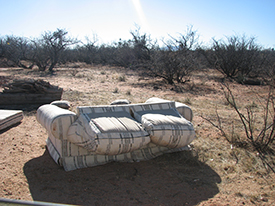| Waste Programs Division: Illegal Dumping: Frequently Asked Questions (FAQ) |
|
What is illegal dumping? Disposal of solid wastes at any location that has not been approved by an authorized agency to accept waste is illegal. Illegal dumping may be prosecuted as a felony or misdemeanor (A.R.S. § 9-499, § 11-268, and § 13-1603). Why are landfills necessary? Legal landfills and transfer stations are permitted and inspected annually to assure they are safe places to dispose of wastes. Permitted landfills are evaluated and approved to ensure proper designs to store and treat waste so that it will not harm people, water or the environment. Landfills and transfer stations restrict wastes they are permitted to accept. Waste is screened by landfill employees to make sure that only allowable wastes are accepted. How does illegal dumping hurt my community? Illegal dumping poses a risk to public health, aquatic habitats, and wildlife. Garbage may attract rodents and other animals. Insects, such as mosquitoes that carry diseases, may hatch in water that pools on the waste. Bacteria can grow in discarded food, diapers and human waste. Hazardous chemicals in household and commercial solid waste may contaminate water and soil. Illegal dumps hurt property values and erode the tax base. Illegal dumping is also a major economic burden on local government, which typically takes responsibility for cleaning up dump sites, diverting funds which could be used for other services. How is ADEQ helping to prevent illegal dumping? In addition to outreach and networking, ADEQ has supported local illegal dumping prevention projects, such as:
How do I arrange for waste to be hauled legally? Beware of unlicensed haulers. If your trash is dumped illegally, the result could be an environmental eyesore and even a citation and fine. Use only licensed businesses to haul your waste. That way, you have some recourse if your waste is not disposed of properly, safely and legally. In addition, you may take the following precautions:
What if I see someone illegally dumping waste? If you see someone dumping waste illegally, please do NOT endanger your safety by approaching the violator yourself. Contact the local law enforcement office instead with the following information:

What if I find an illegal dump? ADEQ encourages anyone who encounters an existing illegal dump to report it. Contact your local solid waste office, environmental enforcement office, code enforcement office or local law enforcement agency. To support the complaint investigation, try to write down as much of the following information down as possible:
Additional Resources
|